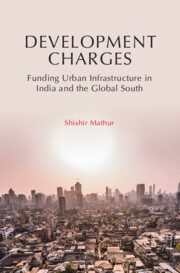Book contents
- Frontmatter
- Contents
- List of Figures
- List of Tables
- Foreword
- Preface
- List of Abbreviations
- 1 Introduction to Development Charges: Normative Bases and Their Role in Local Public Finance
- 2 Use of Development Charges Globally
- 3 Major Design and Implementation Considerations
- 4 Overview of Development Charges in India
- 5 Case Studies of Development Charge Programs
- 6 Recommendations
- 7 Way Forward and Future Research Opportunities
- References
- Index
Foreword
Published online by Cambridge University Press: 12 January 2024
- Frontmatter
- Contents
- List of Figures
- List of Tables
- Foreword
- Preface
- List of Abbreviations
- 1 Introduction to Development Charges: Normative Bases and Their Role in Local Public Finance
- 2 Use of Development Charges Globally
- 3 Major Design and Implementation Considerations
- 4 Overview of Development Charges in India
- 5 Case Studies of Development Charge Programs
- 6 Recommendations
- 7 Way Forward and Future Research Opportunities
- References
- Index
Summary
Urban finance is becoming one of the most important issues in international development. The globally negotiated Agenda 2030 commits the international community to realizing an ambitious set of Sustainable Development Goals (SDGs) around the world in less than a decade. If this is to occur or even to make credible progress, countries and their constituent subnational governments will need to work in new ways and with new partners, and they must effectively use all the governance, fiscal, and managerial mechanisms at their disposal and develop new ones. Finding and properly targeting the resources to take on this ambitious agenda is a particular challenge.
The UN Secretary General’s Synthesis Report on the SDGs states that “many of the investments to achieve the sustainable development goals will take place at the subnational level and be led by local authorities” (UN General Assembly 2014, 22, para. 94).The High-Level Panel on the Post-2015 Agenda claims that “cities are where the battle for sustainable development will be won or lost” (UN 2013, 17). The call for action in the New Urban Agenda (Habitat III) points to the need for particular attention to “addressing the unique and emerging urban development challenges facing all countries, in particular developing countries” (UN-HABITAT 2017, 9, para. 19). The Addis Ababa Action Agenda on Financing for Development highlights the subnational role in financing sustainable development and commits to scaling up international cooperation to support local and regional governments (UNDESA 2015).
The growing recognition of the role of subnational governments in sustainable development is occurring in part because of the rise of decentralization in many countries around the world. High-income countries—and increasingly low and middle-income countries—expect subnational governments to perform an expanding range of public functions. In a large global sample, subnational governments in high-income countries on average accounted in 2020 for 28 percent of total public spending (nearly 14 percent of GDP). Fiscal decentralization is more recent and uneven in many middle- and low-income countries, so subnational spending is typically less significant (except in a group of large or federal countries), on average 11 percent of public spending (around 2 percent of GDP) in the latter group. The difference in the role of subnational governments in public investment is similarly unbalanced—44 percent of total public investment in high-income countries compared to 18 percent in low-income countries (OECD and UCLG 2022).
- Type
- Chapter
- Information
- Development ChargesFunding Urban Infrastructure in India and the Global South, pp. xiii - xviiiPublisher: Cambridge University PressPrint publication year: 2024

